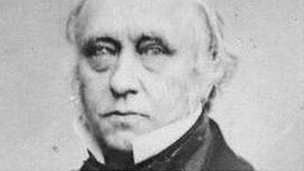Recalling Thomas Macaulay's English legacy
- Published
- comments

Thomas Macaulay wanted as many Indians as possible to be given a Western education
"If you're an Indian reading this book in English, it's probably because of Thomas Macaulay," says the front cover blurb on a new biography of a man who foisted the Queen's language on India.
I am a "Macaulay's child" - usually a pejorative term for an Anglicised Indian - who went to an English medium school, read Dickens and Greene and listened to The Beatles and Stones.
It sounds a bit fey to attribute all this to a man who took on the Orientalists and won the argument for making English language education the basis of a "class who may be interpreters between us and the millions whom we govern; a class of persons, Indian in blood and colour, but English in taste, in opinions, in morals and in intellect".
But, as Zareer Masani writes in the biography, history has proved Macaulay right.
More than 60 years after independence, English has become a passport to upward mobility in the wildly aspirational former colony, and more Indians are learning the language than ever before. As Masani points out, India has endured linguistic division of states and language riots, but English medium schools thrive in towns and villages today.
Masani's admiration for Macaulay, a complex man of protean talents - historian, statesman, scholar, poet, essayist, parliamentarian, colonial administrator, intellectual - is evident in this highly engaging book.
But he's also careful to point out that Macaulay was racist, harboured prejudices about native Indians and customs and, despite being a linguist, did not attempt to master any Indian language. "Macaulay was notoriously dismissive, if not downright hostile and contemptuous, about native Indian, and particularly Hindu, customs and religious superstitions," writes Masani.
Macaulay spent four years in Calcutta, the imperial capital that was at the centre of an intellectual and cultural renaissance, but very little of that is mentioned in his writings.
He grumbled about the heat, public entertainments in the city - "vile acting… viler opera-singing… and things which they called reunions" - and "dull" formal dinners peppered with "deplorable twaddle". The life-long bachelor also had a misogynist streak - he found the lawyers and civil servants he knew in Calcutta had "disagreeable wives". He steadfastly believed that India was not ready for self-rule, and what it could really "have [is] the next best thing - a firm and impartial despotism".
Yet, in what was the first imperial education policy in British India, Macaulay aggressively pushed for English as the medium for as many Indians as possible to be given a Western education.
Masani finds this vision "more egalitarian and inclusive" and less elitist than his arch critics who wanted to promote English among a small elite. Macaulay took a personal interest in running five new English medium schools which opened in Bengal, a year and a half after the reforms began in 1835 - in a single town in Bengal, he wrote, 1,400 boys were learning English. He disliked an excessively pedagogic approach to teaching English - "Give them Jack the Giant Killer and Tom Thumb", he wrote, "and then let them have Robinson Crusoe and Gulliver".
By 1838, when he returned to Britain, Macaulay's reforms had led to the setting up of 40 English medium schools in Bengal which were open to all, quite revolutionary in a society "where lower castes had been strictly forbidden to study". Later, in 1853, his father Charles Trevelyan told a parliamentary committee that some Indians now spoke purer English "than we speak ourselves". More than a century and a half later, many of Macaulay's children can still make the same claim and some of the world's finest writers in English are Indian.
Macaulay: Pioneer of India's Modernisation by Zareer Masani is published by Random House India